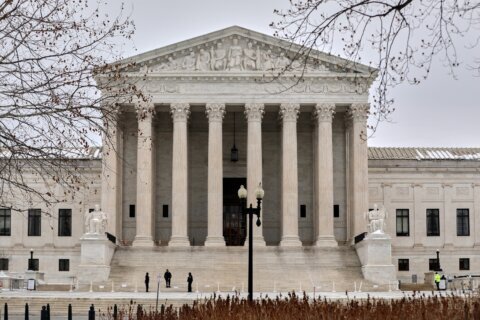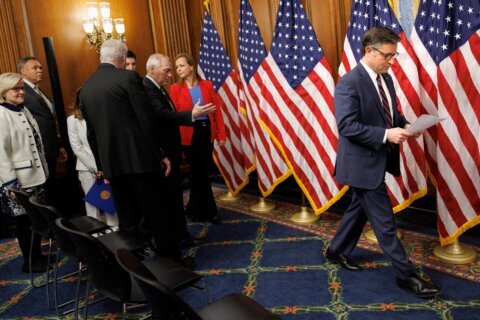With just over a week to go until Election Day, a collection of Democratic candidates and supportive groups are willing to try a strategy that several party strategists acknowledge has not been very successful so far.
They’re hoping a late rush of targeted ads and direct door-to-door outreach focused on January 6, 2021, and the threat to democracy can anger and scare enough of their own base and peel off still undecided voters to counter the momentum they sense moving toward the GOP.
A dozen panicked top Democratic strategists and party leaders acknowledged to CNN that the party has largely failed to get voters to think of GOP candidates’ election denialism as disqualifying or to convince Americans to prioritize democracy when they cast their ballots. What Democrats haven’t done, these strategists said, is connect that argument to voters’ more immediate concerns about the economy and rising costs.
“Normal everyday Americans, it’s hard to care about this big existential thing called democracy when you’re worried about making your next rent payment or trying to buy your kids shoes,” one Democratic strategist told CNN.
The Friday assault on Speaker Nancy Pelosi’s husband by an alleged attacker who posted memes on Facebook and conspiracy theories about the 2020 election and January 6, among other things, has heightened concerns about the state of democracy. But though the attack has Democrats from President Joe Biden and Vice President Kamala Harris making newly urgent warnings in stump speeches — “authoritarianism is on the rise, from Moscow to Mar-a-Lago,” Maryland Sen. Chris Van Hollen said at a Democratic campaign event in Baltimore on Saturday — the insurrection and the prospect of former President Donald Trump’s return to power still won’t be the main focus in any key race in the closing week.
But in close elections, some Democrats believe this late push may be enough to make the difference, even as they worry that voter intimidation, takeovers of local election authorities and expected legal challenges may have already put them behind.
Several Democrats have been running ads that, directly or indirectly, try to tie their opponents to January 6 or the kinds of election conspiracy theories that led to the mob of Trump supporters storming the US Capitol. But those haven’t been the focus of any 2022 campaign, even as some GOP nominees across the country have embraced those kinds of election falsehoods.
Some groups, however, have been taking the democracy message to the streets. BlackPAC, a Democratic-leaning political group, says it has already knocked on 2 million doors of Black voters over the past year across Georgia, North Carolina, Pennsylvania, Michigan, Wisconsin and Nevada — all states with pivotal statewide and US House races — with a not-at-all subtle line.
“Even though we turned out in record numbers in 2020, they still tried to throw out OUR votes in places like Detroit, Philadelphia, and Atlanta,” reads the script, given to organizers and shared with CNN, referring to Republican challenges in certain areas to the 2020 presidential election results.
That message will be amplified in the next two weeks online and on radio stations catering to Black audiences.
‘It’s an abstraction’
But some Democrats who’ve been watching the numbers are doubtful how much they can squeeze out of this strategy.
Even President Joe Biden, after delivering a red-lit speech last month about the midterm elections as a “battle for the soul” of democracy, has mostly moved on from that theme, keeping his midterm closing arguments focused on warnings about the economic consequences of Republicans in charge, and making only a passing reference to Democrats protecting “our very democracy.”
“It is an abstraction to a lot of people,” one top House Democratic strategist told CNN, frustrated by the direction of the polls. The generic congressional ballot continues to show the parties running about even, but Biden’s low approval rating — combined with the dominance of economic concerns for voters — portends bad news for the party in power.
Republican operatives say they aren’t worried about Democrats’ democracy messaging hurting their candidates — and in only one Ohio district does it seem a GOP nominee’s January 6 ties may have helped to reduce Republican chances of picking up the seat. And a good chunk of the voters saying they’re worried about democracy are in fact Republicans who have internalized Trump’s lies about a stolen election, according to conversations with five pollsters and strategists briefed on internal surveys.
Yet some Democrats involved in on-the-ground engagement think they’re seeing promising signs about the potential for turnout of voters who may care about the issue. Greg Speed, the president of the Democratic-supportive outreach group America Votes, said he is heartened that members of his coalition have knocked on 14.4 million doors in the seven most contested states. Some of the conversations he’s had in the field, combined with high early turnout in some key states, have convinced Speed that there may be surges of voters that are not being accounted for in most polling models.
Speed said he’s focused on people who didn’t vote in 2016, but did vote in 2018 and 2020, as well as those who’ve registered in the past few months, and is making the argument that Republicans are trying to shut them out of the process.
“It clicks,” Speed said.
After last year’s Virginia governor’s race, when Democrat Terry McAuliffe’s efforts to tie Republican Glenn Youngkin to Trump in a state Biden had won by 10 points just the year before fell flat, Democrats insisted they need to look forward instead of training their attention on the former President. But what groups like Stop Him Now, a small group placing targeted online ads in Pennsylvania, are seeing suggests that maybe there’s utility in a Trump message.
And now some Democratic operatives — who are watching Youngkin campaign around the country with a range of GOP candidates, including Trump-backed election deniers — whisper to each other that maybe McAuliffe was more right than they gave him credit for at the time, even though Youngkin wasn’t the easiest GOP nominee to tie to Trump at the time.
What connects with voters as a hit on Republicans, said Molly Murphy, a pollster working with Stop Him Now, is “not they’re going to be just like Trump, but that they’re going to help him get into office.”
January 6 doesn’t feature prominently in Dem advertising
Virginia Rep. Elaine Luria, the only member of the House select committee investigating January 6 who’s still facing a competitive election, has highlighted her work on the committee in her closing campaign messaging. Her recent ads also accuse her Republican opponent of being “an election denier” (a line she used in a recent debate) and of clinging “to the big lie that fueled the violence.” Republican Jen Kiggans has refused to say whether Biden was legitimately elected, and as Luria has pointed out, she voted in the state Senate to approve $70 million to audit the 2020 election in the commonwealth.
But most Democratic candidates have so far left talking about democracy to passing moments, like jabs at their opponents in debates, mentioning it only when asked — even when their Republican rivals provide ample material that, to many in the Democratic base, would seem completely disqualifying.
In Nevada, Sen. Catherine Cortez Masto — perhaps Democrats’ most vulnerable incumbent this year — said earlier this month with a number of Republican leaders in Reno that there should be “consequences” for the lawsuits her GOP challenger, former state Attorney General Adam Laxalt, filed on behalf of the Trump campaign in the wake of his 2020 loss and Laxalt’s repeated comments about a stolen or rigged election. Cortez Masto has called his actions “unforgivable.” Democrats have moved to amplify and echo that in advertising over the final month of the campaign.
But only recently did anything about democracy feature in an ad against Wisconsin Sen. Ron Johnson, the most vulnerable Senate Republican running for reelection. Johnson has repeatedly downplayed the January 6 insurrection, including earlier this month, and his office was even involved in pushing “fake” electors for Trump that day.
The ad from Senate Majority PAC, the main outside group affiliated with Senate Democrats, features a retired Madison police captain talking about Johnson “making excuses for rioters who tried to overthrow our government,” over images of the windows being smashed and a flag-draped officer’s coffin. Johnson, the officer adds, “supported efforts to make it harder for some people to vote at all.”
Democratic sources involved say much smaller, very targeted online appeals have been made in Wisconsin and other races.
Wisconsin Democratic candidate Brad Pfaff has an ad filled with footage of the riot and a picture of Republican Derrick Van Orden, his opponent in the open 3rd Congressional District. Van Orden, who is facing no criminal charges, was at the Capitol on January 6 but has written that he never entered the building and left the grounds “when it became clear that a protest had become a mob.” And a group called Center Forward went up earlier this month with an ad using a similar format.
But Democrats have largely pulled back on attacking Van Orden in the district, which is rated Lean Republican. A spokesperson for the Democratic Congressional Campaign Committee defended “an investment of over $70,000,” spinning the triage of funds to other races.
A disconnect over future danger
Colorado Rep. Jason Crow, who was trapped in the House gallery on January 6, said the prospect of serving along some of the people who came to Washington to contest the election has been a constant topic in both the text chain among members who were sheltering together that day, and among constituents he’s hearing from at town halls in his district.
The two-term Democrat, who does not face a competitive reelection, said he tries talking about how autocratic governments are bad for their economies and have a hard time feeding their people. But he knows that’s not as visceral as those videos of Pelosi trying to call in law enforcement to potentially save his and his colleagues’ lives.
“This is a very real and current danger to our democracy,” Crow said, with some frustration. “This is not a history lesson. This is not something of the past. This is something of our present.”
Rep. Pramila Jayapal, who was cowering in the gallery with colleagues that day, shares those concerns. “The idea that our democracy is breaking, that fascism is at our door, is very personal,” said the Washington state Democrat, who helped shape the Biden economic agenda as the chair of the Congressional Progressive Caucus and does not face a competitive reelection.
And yet many Republicans — even those who ultimately voted to certify the 2020 election in Congress that day — don’t seem to think that candidates who objected to the results pose a threat to democracy.
“I’ve heard a lot of talk from Democrats about the threats to democracy this election cycle,” Arkansas Sen. Tom Cotton said on Wednesday while campaigning for North Carolina GOP Senate nominee Ted Budd, who, unlike the senator, objected to the certification of Biden’s victory.
“I think the Democrats are now getting a little more worried about the threats from democracy, because the voters are about to repudiate their agenda in these elections,” Cotton added.
But the threat goes beyond the midterms, or any election, said Rep. Karen Bass, the Democratic congresswoman from Los Angeles currently running for mayor, as she responded to the attack on Pelosi’s husband at home last week, which was widely condemned by both Democrats and Republicans.
“It just shows us the danger that our democracy is in,” Bass told CNN, “and it also makes me angry thinking of my Republican colleagues who attempt to minimize what happened on January 6 and who ignored the hate speech, the violent speech that is going on right now.”







